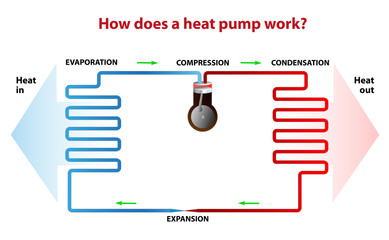Heat Pumps: Insights from the UK Parliament Report – What You Need to Know!

Heat Pumps: Insights from the UK Parliament Report

In the pursuit of a sustainable and eco-friendly future, addressing our energy consumption becomes paramount. A significant portion of the UK’s energy consumption is attributed to heating, predominantly from burning fossil fuels like natural gas. To combat this, the UK Parliament recently released a groundbreaking report on heat pump technology and its potential impact on reducing CO2 emissions in homes. In this educational blog, we explore the benefits of heat pumps, factual statistics on their usage in the UK, and their transformative potential in shaping a greener future.
Heat pumps are ingenious devices that extract heat from the external environment and transfer it into buildings, providing space heating and hot water. By utilising the same principle as refrigeration and air conditioning, heat pumps run on electricity, making them a viable alternative to fossil fuel boilers. When coupled with the decarbonisation of electricity supply, they significantly reduce CO2 emissions from heating, making them an environmentally friendly solution.

The Benefits of Heat Pumps
Reduced CO2 Emissions: One of the most significant advantages of heat pumps is their role in mitigating greenhouse gas emissions. As per the Climate Change Committee’s projections, heat pumps could potentially be needed in 80% of UK homes by 2050 to achieve net-zero emissions.
Energy Efficiency: Heat pumps operate efficiently, producing more heat energy than the electrical energy consumed. Their efficiency is measured using the Seasonal Performance Factor (SPF), with Ground Source Heat Pumps (GSHPs) typically having higher SPFs than Air Source Heat Pumps (ASHPs).
Cooling Capability: Certain heat pumps can also provide cooling, making them versatile solutions for both heating and cooling needs.
The UK has witnessed substantial progress in the adoption of heat pumps, but there remains significant potential for further growth. As of 2022, 72,000 heat pumps were installed in UK homes. However, some European countries have already made remarkable strides in heat pump utilisation, with Norway and Sweden leading the way at 60% and 43% of homes, respectively.
The UK Government’s Heat and Buildings Strategy aims to install 600,000 heat pumps annually by 2028. Though ambitious, this target is essential to accelerate the transition to greener heating solutions. Long-term policy support is vital for making heat pumps the most economically viable option for consumers, providing financial aid to those who cannot afford the transition, and gradually phasing out fossil fuel systems.
Despite the undeniable benefits of heat pumps, challenges remain. Retrofitting heat pumps in certain types of buildings, such as flats and terraced houses, requires careful consideration due to space constraints and potential complexities. However, solutions like networked GSHPs or air-to-air heat pumps can be viable alternatives.
The UK Parliament’s report on heat pump technology highlights the tremendous potential these devices hold in revolutionising our approach to heating. With reduced CO2 emissions, improved energy efficiency, and cleaner air, heat pumps are undeniably a vital tool in the fight against climate change. As we move towards a greener future, long-term strategic policies, financial support, and continued technological advancements will pave the way for wider adoption, creating a sustainable and brighter tomorrow for generations to come.
For a comprehensive understanding of the subject, we encourage readers to access and read the full report on heat pump technology by the UK Parliament here. It contains valuable insights and information that can further enhance your knowledge on this topic.
Contact us at contact@qenergy.ai or call 0161 706 0980 to explore the benefits of Air Source Heat Pumps and take a step towards a greener and more energy-efficient lifestyle. Let technology empower you on your journey towards a sustainable future.
